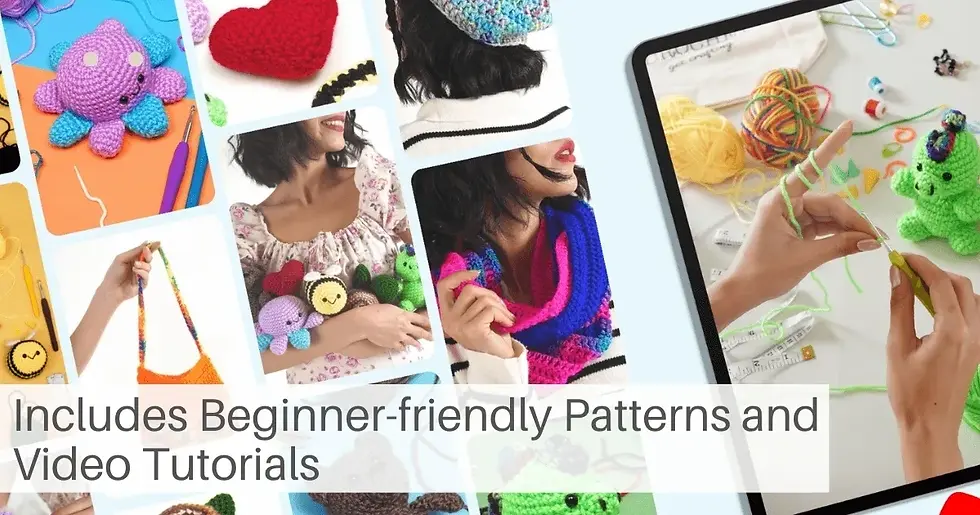
Are you a crochet enthusiast struggling to create those perfect stitches and patterns?
You're not alone!
Many beginners find themselves facing challenges when trying to master the art of crocheting.
From maintaining proper tension to understanding tricky terminology, there's plenty for novice crafters to learn.
However, with patience, practice, and guidance from seasoned experts, anyone can overcome these hurdles and flourish in their newfound hobby.
In this blog post, we'll explore common reasons why people struggle with crocheting and share helpful tips on how to conquer them.
Key Takeaways
Beginners may struggle with crocheting due to a lack of patience, difficulty maintaining proper tension, confusion over terminology, and using the wrong hook size.
Overcoming crochet struggles requires regular practice, seeking guidance from experienced crocheters through online tutorials or in person, and keeping an open mind when learning new techniques.

Common Reasons Why People Struggle To Crochet
Beginners may struggle with crochet due to lack of patience, difficulty maintaining proper tension, confusion over terminology, and using the wrong hook size.
Lack Of Patience And Focus
One of the primary reasons individuals may struggle with crochet, particularly when first starting out, is a lack of patience and focus.
Crocheting requires dedication and meticulous attention to detail since even a small mistake can lead to significant imperfections in the final product.
For example, dealing with tight stitches might be frustrating for some beginners, as these are often caused by pulling the working yarn too taut or using an incorrect hook size (Fact 5).
Similarly, losing focus while counting rows can result in projects curving unintentionally or tension inconsistencies.
Remember that crocheting has been found to provide relief from ADHD and aid in staving off dementia and Alzheimer's (Fact 4), demonstrating that developing patience and mental acuity through this craft has numerous benefits beyond creating beautiful items.
Difficulty Maintaining Proper Tension
One of the most common struggles for beginners in crocheting is maintaining proper tension throughout their projects.
Tension refers to how tight or lose your stitches are, and having uneven tension can result in a project that doesn't look quite right.
Tight stitches may be caused by pulling the working yarn too tightly, while loose stitches may come from not pulling it tightly enough.
To ensure consistent tension, it's important to practice and pay attention to how tight or lose you're making each stitch.
If you notice one row looks significantly different from another, try counting your stitches per row and checking that they match up with the pattern or instructions you're following.
Checking your gauge before starting a larger project can also help prevent any major issues with tension further down the line.

Difficulty Understanding Crochet Terminology
Crochet terminology can be confusing for beginners who are just starting out.
With terms like "chain," "single crochet," and "double crochet," it can be hard to understand what they mean without clear explanations.
One common issue is when patterns use abbreviations for stitches that aren't immediately recognizable.
For example, SC could refer to either single crochet (US) or double crochet (UK), depending on the pattern's origin.
Another potential source of confusion is understanding how many chains you need to begin a project properly.
Remember: don't let difficult terminology discourage you from learning how to crochet!
Anyone can learn with practice and patience, so keep at it until everything clicks into place.
Using The Wrong Hook Size
Another common reason why beginners struggle with crochet is using the wrong hook size.
Using a hook that is either too large or too small for the yarn can result in uneven tension and stitches that don't match the intended gauge of the project.
It's important to choose a hook size based on the weight and texture of your yarn, as well as the stitch pattern you'll be using.
For example, using a larger hook with thick, bulky yarn can create looser, airy stitches ideal for creating scarves or blankets.
Choosing the right hook size may take some trial and error at first but paying attention to your tension and checking your gauge regularly throughout your project will help ensure consistent results.
Don't be afraid to experiment with different hooks sizes until you find one that feels comfortable in hand and produces pleasing results.

Tips To Overcome Crochet Struggles
To overcome crochet struggles, regular practice is essential.
Seek guidance from experienced crocheters, utilize online tutorials, and keep an open mind when learning new techniques.
Regular Practice
One of the most important things you can do to overcome your struggles with crochet is practice regularly.
Start with simple projects such as dishcloths or scarves that use basic stitches like single and double crochet, then work your way up to more complex patterns.
Don't get discouraged if it takes time to see progress; remember that even experienced crocheters started out as beginners!
The more you practice, the easier it will become to maintain proper tension, understand terminology, and troubleshoot common issues like uneven stitches.
Seek Guidance From Experienced Crocheters
One of the best ways to improve your crocheting skills is by seeking guidance from experienced crocheters.
Here are some tips for finding and learning from them:
Join a local crochet group: Look for crochet groups or clubs in your community. This is a great way to connect with other crocheters, learn new techniques, and get feedback on your projects.
Attend workshops and classes: Check out local yarn stores or craft stores for workshops or classes on crocheting. You can also find online classes and webinars that cover specific techniques or patterns.
Follow crochet blogs and social media accounts: Many experienced crocheters share tutorials, tips, and inspiration on their blogs and social media accounts. Follow them to learn new things about crochet.
Participate in online forums: There are many online communities dedicated to crochet where you can ask questions, share your work, and get feedback from other crocheters.
Ask friends or family members who crochet: If you know someone who has experience with crocheting, ask them for help or advice. They may be able to teach you new techniques or recommend helpful resources.
Remember that everyone starts as a beginner at some point, so don't be afraid to ask for help or guidance when you need it.
With practice and the right guidance, you can improve your crocheting skills and create beautiful projects!

Utilize Online Tutorials
Online tutorials can be a great resource for beginners looking to improve their crochet skills.
Here are some tips for utilizing online resources effectively:
Find reliable sources: Look for well-established websites or blogs that have good reputations in the crochet community.
Watch step-by-step videos: Video tutorials can be especially helpful as you can see exactly how each stitch is made.
Follow along with written instructions: Sometimes, written instructions may be easier to follow than video tutorials. Look for patterns with clear, easy-to-understand instructions.
Join online communities: Joining online crochet groups or forums can provide access to a wealth of information and support from experienced crocheters.
Take advantage of social media: Instagram and Pinterest are great platforms for finding inspiration and new techniques to try.
Experiment with different types of projects: Try making different things like hats, scarves, or baby blankets to improve your skills in various areas.
Remember, practice makes perfect!
Don't get discouraged if you don't get it right the first time, keep practicing and asking questions until you master the art of crochet.
Conclusion
In conclusion, it's common for crochet beginners to struggle with maintaining proper tension, understanding terminology, and choosing the right hook size.
However, with regular practice and seeking guidance from experienced crocheters through online tutorials or in person, these struggles can be overcome.
Improving your crochet skills takes patience and time but the benefits of this craft are worth it - providing relief from stress and even improving brain function.

FAQs:
What are some common reasons people struggle with crocheting?
Some common reasons for struggling to crochet could be difficulty understanding the pattern or instructions, using the wrong size hook or yarn, lack of experience, poor tension control, or not knowing basic stitches.
How can I improve my crocheting skills?
Improving your crocheting skills involves practicing consistently and seeking guidance from tutorials or classes. Start with simple patterns and gradually move up to more complex ones. Additionally, taking breaks to rest your hands and working in a comfortable environment can help prevent frustration.
What should I do if I encounter mistakes in my crochet work?
When encountering mistakes while crocheting, it is important to remain patient and avoid giving up. The mistake may simply require undoing a few stitches or slowing down to better understand the pattern's instructions.
Is it normal to have trouble with certain types of projects even after mastering basic techniques?
Yes! Some projects are more challenging than others regardless of skill level so don't get discouraged by unexpected difficulties along the way - take them as opportunities to learn new things instead!






Comments